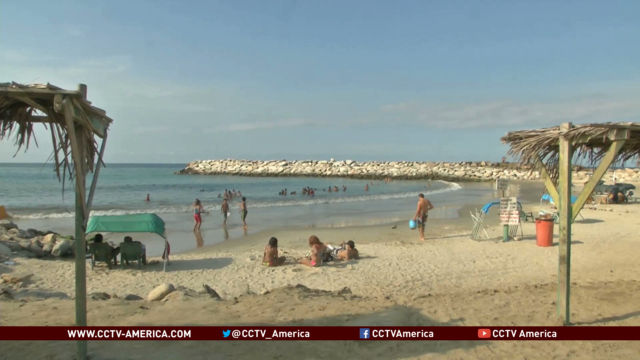Venezuela has a plan to buy it a little time as oil prices continue to fall. The hope is to generate money from some of its other natural resources: beaches and tourist attractions. However, the government may still need to do more to attract tourists. CCTV America’s Martin Markovits reported this story.

Poor infrastructure hinders tourism growth in Venezuela
Venezuela has a plan to buy it a little time as oil prices continue to fall. The hope is to generate money from some of its other natural resources: beaches and tourist attractions. However, the government may still need to do more to attract tourists. CCTV America's Martin Markovits reported this story.Venezuela is home to the longest Caribbean coastline. Other natural wonders like rain forests and breath-taking waterfalls abound. But the tourists just aren’t visiting the country. Members of Venezuela’s travel industry are discussing the government’s plan to boost its faltering travel sector. Those who make a living through tourism say the government has its work cut out. The country suffers from outdated infrastructure ranging from domestic flights to hotels.
“Colombia has a very strong marketing name abroad and Brazil also. We need to focus on having a very good infrastructure, good resources for doing reservations and also start to market Venezuela in the international tourism sector,” Manuel Patino, Venezuela Travel agency Owner said.
There are hundreds of miles of tropical Coastline to enjoy in Venezuela. But a lack of government spending on tourism and deteriorating infrastructure are leaving a majority of these beaches empty. For years, Venezuela has neglected its tourism industry, instead focusing on its money-making oil industry. But with the drop in oil prices and a shortage in revenue, President Nicolas Maduro’s government is now looking to tourism to stay afloat. Caracas is hoping its long-neglected local industry can generate nine percent of the country’s gross domestic product in the next five years.
Plans are to create 60,000 jobs in the tourism sector; attract more vacationers from Colombia and Brazil and promote Venezuela’s food and culture in an effort to attract more international tourists. Many travelers say it’s not a lack of attractions keeping them away, rather, it’s because the country’s homicide rate is one of the world’s highest. But government officials say it is an unfair image perpetuated by the western media which vilifies Venezuela’s socialist government.
“Our problem with security isn’t as big of a deal as in other places. Our fundamental problem is an image problem. We’re fighting a media war with many transnational media outlets. It’s meant to damage the Bolivarian Revolution and perpetuate the idea that we have an ungovernable country,” Andres Izarra, Minister of Tourism said.
And changing that image is at the forefront of revamping the travel sector, but with Venezuela’s economic problems and long-standing neglect, it will be a difficult task ahead.
 CGTN America
CGTN America
